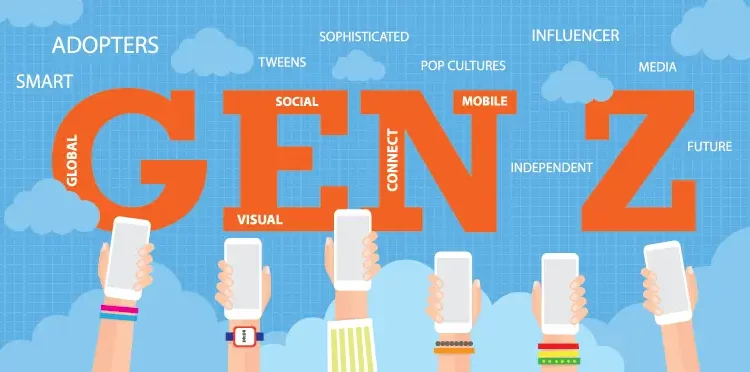Gen Z represents a significant economic force, with their projected spending power expected to reach £3 trillion by 2030, making them an essential focus for modern marketing strategies. Marketing to Gen Z is no longer optional—it’s mission-critical for brands aiming to stay relevant in a rapidly evolving digital landscape.
This influential generation comprises approximately two billion individuals, accounting for more than a quarter of the global population. However, engaging with this demographic requires more than mere reach and demands a profound understanding of their unique perspective. Their values are clear: they prioritise authenticity in brand interactions and actively seek companies that demonstrate a genuine commitment to positive social change. That’s the heart of Gen Z branding—a blend of purpose, identity, and experience.
Traditional marketing approaches have become increasingly ineffective, particularly as Gen Z predominantly discovers new products through social media platforms and shows remarkable engagement with interactive video content. This comprehensive guide will help you develop marketing strategies that resonate meaningfully with this transformative generation.
Understanding the Gen Z Market (Why Traditional Marketing Fails)
Gen Z, comprising individuals born between 1995 and 2010, distinguishes itself as the first genuinely digital-native generation. Having grown up alongside the evolution of the internet, social networks, and mobile technologies, they have developed into a hypercognitive group that expertly navigates and synthesises information from diverse sources.
Conventional marketing approaches prove ineffective with Gen Z because of their distinctive information processing patterns. They approach brands and products with analytical rigour, practical mindsets, and unprecedented access to information. Moreover, they value self-expression, resist categorical classifications, and make decisions based on thorough evaluation.
The 8-Second Attention Span (and How to Grab It)
Perhaps the most significant challenge marketers face is Gen Z’s rapidly shifting attention span. Recent studies indicate that Gen Z maintains focus for approximately eight seconds, compared to the slightly longer attention span of millennials. This reduction in attention span represents a notable shift in information consumption patterns.
However, this shorter attention span should not be misinterpreted as a lack of intelligence. Rather, it reflects an adaptive response to growing up in an information-saturated environment, functioning as an efficient filtering mechanism for rapidly identifying relevant content.
To effectively engage within this brief window of opportunity:
- Create snackable content: Use Instagram Reels, YouTube Shorts, and even vernacular video platforms like Moj and Josh in India to deliver crisp, emotionally resonant stories.
- Emphasise visual communication: Indian fashion brand Bewakoof uses raw, meme-driven visuals to effectively engage with Gen Z.
- Focus on personalisation: Whether it’s Netflix’s “What to Watch” feature or Spotify’s “Daily Mix,” how to connect to Gen Z is about curating content that feels personal and timely.
Above all, authenticity remains paramount. Gen Z possesses an inherent ability to detect marketing artifice and consistently rejects traditional advertising approaches that rely on broad generalisations or overly polished presentations.
How To Target Gen Z: Marketing Strategies That Actually Work
Engaging with Gen Z requires a fundamentally different approach to marketing. As digital natives, they seek genuine, meaningful content that reflects their sophisticated understanding of technology and media.
Digital Natives with a Built-In Detector
Having grown up in a digital landscape, Gen Z demonstrates remarkable acumen in distinguishing authentic marketing from manufactured campaigns. Their extensive exposure to digital content has cultivated sophisticated filtering mechanisms. Traditional advertising methods prove largely ineffective with this demographic, necessitating a shift towards content that facilitates genuine dialogue rather than conventional promotional messaging. From Flipkart’s short video reviews on product pages to Nykaa’s mini-tutorials on Instagram, Indian brands are already understanding how to connect with Gen Z through short-form, informative, and fun content.
Value-Driven Consumers
This generation gravitates towards brands that demonstrate genuine alignment with their principles. They actively seek out companies that take meaningful stances on social issues, displaying heightened engagement with organisations that demonstrate authentic social responsibility. However, they readily dismiss superficial attempts at social engagement.
Authenticity is Non-Negotiable
In Gen Z marketing, authenticity supersedes perfection. This generation responds positively to genuine representation in advertising, particularly appreciating content that showcases real customers and authentic experiences. They demonstrate a marked preference for unfiltered, realistic content, especially favouring behind-the-scenes glimpses that reveal a brand’s genuine character.
Video First, Always
Video content commands significant attention from Gen Z, with short-form content emerging as a particularly effective medium for product discovery. From Flipkart’s short video reviews on product pages to Nykaa’s mini-tutorials on Instagram, Indian brands are already understanding how to connect to Gen Z through short-form, informative, and fun content.
Social Media (Beyond Just Posting)
Effective marketing to Gen Z goes beyond likes. Indian companies like Mamaearth and CRED are creating storytelling loops, where user feedback, behind-the-scenes content, and brand values are shared transparently. Gen Z prefers brands that talk with them, not at them.
- Instagram serves as their primary visual discovery platform
- TikTok fulfils their entertainment requirements
- Snapchat facilitates private communications
Influencer Marketing
Collaboration with micro-influencers proves particularly effective, generating substantially higher engagement compared to celebrity endorsements. Gen Z demonstrates a clear preference for authentic expertise over mere fame, responding positively to partnerships that exhibit genuine alignment.
Successful Gen Z engagement necessitates maintaining authenticity, purpose and meaningful interaction across all touchpoints.
Personalisation and Customisation are Key
Personalisation stands as a fundamental requirement in Gen Z branding strategies. This generation views customisation not as a luxury but as an essential offering. Research indicates their strong inclination towards customisable products and willingness to share personal data in exchange for tailored experiences.
Purpose-Driven Marketing
Brands demonstrating authentic commitment to meaningful causes naturally resonate with Gen Z consumers. Contemporary market research reveals that purpose-driven consumers constitute a significant portion of the market, with Gen Z showing particular interest in companies that demonstrate genuine social responsibility. Airtel and Jio offering data-cashback or student-exclusive plans, are classic cases of marketing to Gen Z through value-driven personalisation. Brands that can align rewards with real-life needs build faster trust with younger consumers.
Gamification and Interactive Experiences
The digital-native generation demonstrates a marked preference for interactive content experiences. Their inclination towards gaming over traditional video content has transformed gamification into a compelling marketing approach. Brands like Tata Neu and Paytm use gamified cashback offers and spin-the-wheel experiences to boost stickiness. Even government initiatives like MyGov India use interactive quizzes and challenges to engage younger citizens. These are smart examples of how to connect to Gen Z through active participation.
Financial Consciousness and Value
Whilst Gen Z demonstrates a willingness to invest in personalised experiences, they maintain a pragmatic approach to financial decisions. Their sophisticated shopping behaviour includes strategic timing of purchases and increasing participation in loyalty programmes. Forward-thinking companies respond by offering transparent pricing structures, targeted educational discounts, and personalised reward systems that align with individual preferences and purchasing patterns.
For Gen Z, personalisation transcends conventional marketing strategies—it represents an acknowledgement of their individual identity. Their emphasis on customer experience in brand selection necessitates that companies develop sophisticated personalisation capabilities to establish enduring relationships with this technologically adept generation.
Measuring Success with Gen Z
Traditional success metrics require recalibration when marketing to Gen Z, particularly considering their notably brief attention span. This necessitates a fundamental shift in how organisations evaluate campaign effectiveness.
Beyond Vanity Metrics
Contemporary marketing assessment requires looking beyond superficial engagement metrics. Gen Z seeks meaningful connections with brands, necessitating evaluation of:
- Private sharing behaviour: Their preference for sharing content through private channels rather than public platforms
- Community engagement: Their strong desire for brand-facilitated belonging
- Purpose alignment: Their commitment to supporting sustainable practices
Understanding Conversion Pathways
Gen Z exhibits distinct shopping behaviours compared to previous generations. Their purchase journey typically involves thorough research, including consultation of trusted online voices. Social media plays a pivotal role in brand discovery, particularly in specific sectors like fashion.
Organisations must adopt comprehensive tracking systems that acknowledge multiple touchpoints. This generation conducts thorough brand research before making purchasing decisions, typically discovering products through social channels before conducting detailed research and potentially completing purchases in physical locations.
Long-Term Loyalty and Advocacy
Gen Z’s approach to brand loyalty manifests differently from conventional patterns. Their expression of loyalty extends beyond traditional purchasing behaviour, with a significant proportion viewing brand advocacy amongst peers as a meaningful demonstration of allegiance. Moreover, they cultivate emotional connections with brands that align with their values, even when immediate purchasing capacity may be limited.
To effectively gauge success with this demographic, organisations must incorporate comprehensive sentiment analysis and advocacy measurements into their evaluation frameworks. Loyalty programmes targeting Gen Z should deliver transparent value propositions whilst fostering recognition, memorable experiences, and meaningful community engagement. These priorities necessitate careful monitoring of metrics such as user-generated content and community development, alongside conventional conversion measurements.
Conclusion
Engaging Gen Z requires a fundamental transformation of traditional marketing approaches. Their distinctive characteristics—digital sophistication, values-driven outlook, and unwavering demand for authenticity—distinguish them markedly from their predecessors.
Organisations achieve success with Gen Z through a genuine understanding of their priorities rather than relying on conventional marketing methodologies. With over 14 years of expertise in the digital marketing arena, ODigMa has analysed and curated a collection of strategies that pertain to different niches in this vast space. We believe that short-form video content, bespoke experiences, and authentic brand values facilitate meaningful connections with this influential demographic.
We’ve seen that marketing to Gen Z is most effective when it adapts to their world. If you’re still wondering how to connect to Gen Z, start with their language: authenticity, agility, and action.
They seek authentic relationships with organisations that demonstrate shared values and contribute meaningfully to societal progress. Companies that adapt their strategic approach accordingly will establish enduring connections with this influential generation, which commands substantial economic influence. If you are a brand or an individual looking to understand the changing metrics in the digital space, ODigMa offers you hundreds of resources. Visit our website to read more blogs or to schedule an appointment with us if you need any further resources to boost your online presence and appeal to various audiences.
Frequently Asked Questions
1. How can organisations effectively capture Gen Z’s attention?
Develop compelling, concise visual content that establishes relevance within the initial moments of engagement. Short-form video content on contemporary platforms proves particularly effective, as Gen Z demonstrates sophisticated content filtering capabilities.
2. What marketing strategies resonate with Gen Z consumers?
This demographic responds positively to authentic, values-driven content delivered in a conversational manner. They favour organisations that demonstrate genuine commitment to societal issues whilst offering personalised experiences and fostering community engagement across digital platforms.
3. How significant is personalisation in Gen Z marketing?
Personalisation proves essential for Gen Z engagement. They demonstrate strong preferences for customisable experiences and products, showing willingness to share relevant data in exchange for tailored interactions.
4. What role does social responsibility play in attracting Gen Z customers?
Social responsibility significantly influences Gen Z’s purchasing decisions. However, organisations must demonstrate authentic commitment to their chosen causes, as this demographic readily identifies superficial activism.
5. How should organisations measure marketing success with Gen Z?
Success metrics should transcend traditional engagement measurements. Focus on meaningful engagement indicators such as private content sharing, community participation, and brand advocacy. Consider their unique conversion journey, which typically involves comprehensive research across multiple touchpoints before purchase completion.


 100 short Instagram Captions to Boost Your Engagement
100 short Instagram Captions to Boost Your Engagement Digital Marketing For Doctors In India
Digital Marketing For Doctors In India A Comprehensive Guide to Programmatic Advertising (2025)
A Comprehensive Guide to Programmatic Advertising (2025) How to choose the Best Search Engine Marketing (SEM) agency in Bangalore
How to choose the Best Search Engine Marketing (SEM) agency in Bangalore Social Media Marketing for Healthcare: The 5 Step Plan
Social Media Marketing for Healthcare: The 5 Step Plan